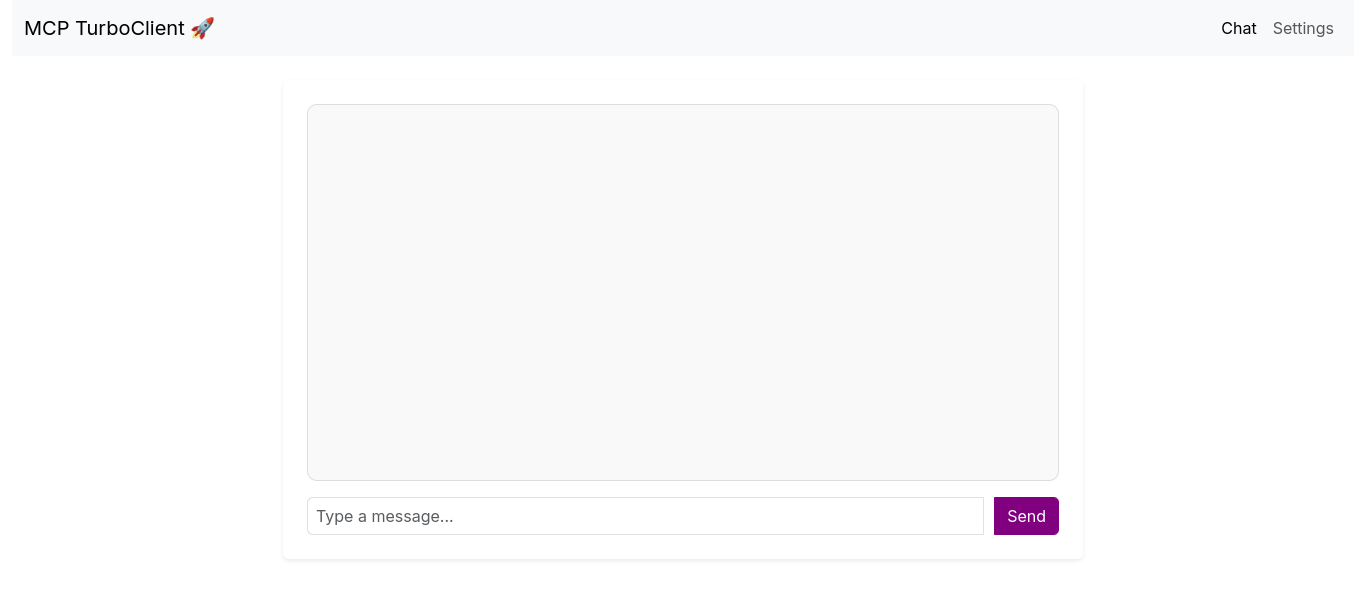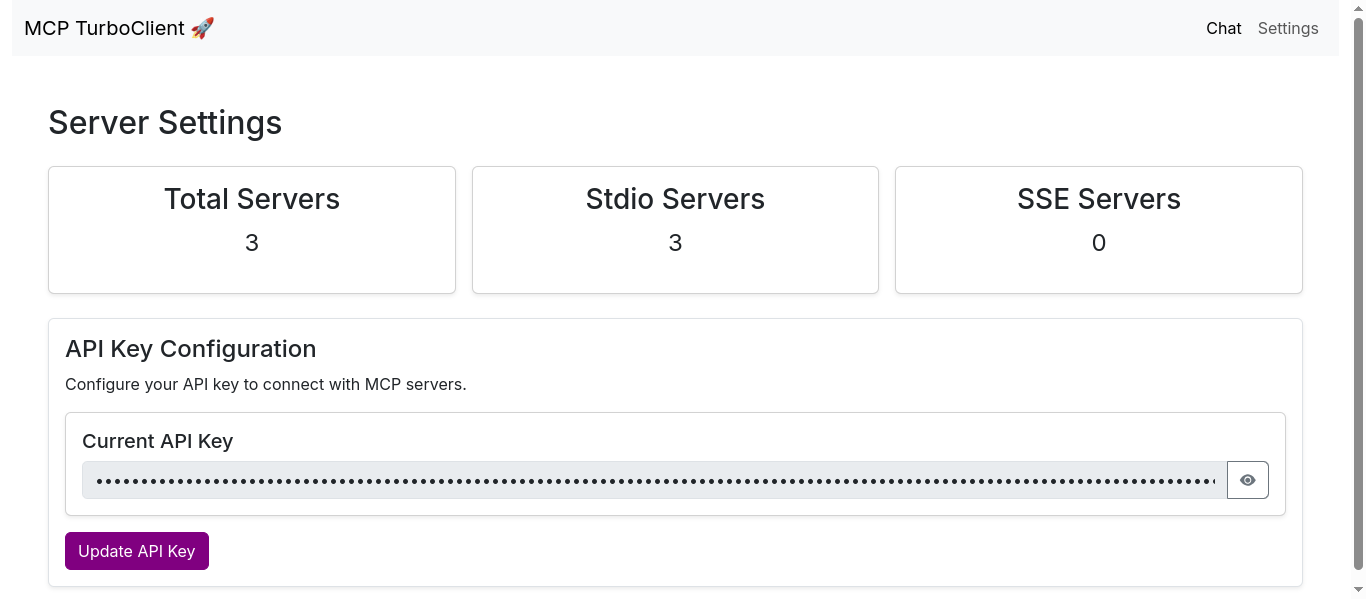 techspawn/mcp-turboclientUpdated 22 days ago00
techspawn/mcp-turboclientUpdated 22 days ago00
Turbo MCP Client 🚀
A FastAPI-based application that provides a web interface for interacting with Models Context Protocol (MCP) servers while utilizing OpenAI's API for processing messages.
Overview
This application allows users to:
- Connect to multiple MCP servers simultaneously
- Process messages through OpenAI's API
- Interact with the system via a web-based chat interface
- Configure and store API license keys
Tech Stack
Client: html, css, js, bootstrap, animatedjs
Server: FastAPI, Openai, MCP
Features
- Connect multiple servers at a time
- Use websocket any where you want
Screenshots


Installation
-
Clone the repository:
git clone https://github.com/techspawn/Turbo-MCP-Client.git cd openai-mcp -
Install dependencies:
uv pip install -r requirements.txt -
Set up your environment variables:
export MODEL_NAME="gpt-4o" # or your preferred OpenAI model
Environment Variables
To run this project, you will need to add the following environment variables to your .env file
MODEL_NAME=gpt-4o
Configuration
-
Create a
config.jsonfile in the root directory:{ "mcpServers": { "server1": { "command": "your_command", "args": ["arg1", "arg2"] }, "server2": { "command": "another_command", "args": ["arg1", "arg2"] } } } -
Initialize the SQLite database:
import sqlite3 conn = sqlite3.connect("mcp_config.db") cursor = conn.cursor() cursor.execute("CREATE TABLE IF NOT EXISTS config (license_key TEXT)") conn.commit() conn.close() -
Configure your OpenAI API key through the web interface.
Usage
-
Start the application:
uvicorn main:app --reload -
Open your browser and navigate to
http://localhost:8000 -
Enter your OpenAI API key in the web interface to save it to the database
-
Use the chat interface to send messages that will be processed through the MCP servers and OpenAI
Usage
-
Start the application:
uvicorn main:app --reload -
Open your browser and navigate to
http://localhost:8000 -
Enter your OpenAI API key in the web interface to save it to the database
-
Use the chat interface to send messages that will be processed through the MCP servers and OpenAI
Project Structure
├── images/ # Directory for storing image assets
│ ├── chat_window.png # Screenshot of the chat window
│ └── setting_page.png # Screenshot of the settings page
├── models/ # Contains Python modules related to data models
│ ├── __init__.py # Makes the 'models' directory a Python package
│ ├── client.py # Defines client-related logic (e.g., API client, user handling)
│ ├── config.py # Handles application configuration settings
│ └── py.typed # Indicates that this package supports type hints
├── static/ # Placeholder for static assets (CSS, JavaScript, images)
├── templates/ # Directory for HTML templates
│ ├── base.html # Base template for consistent layout across pages
│ ├── chat.html # Template for the chat interface
│ └── settings.html # Template for the settings page
├── .env # Environment variables (e.g., API keys, credentials)
├── .gitignore # Specifies files to be ignored by Git
├── .python-version # Defines the Python version for this project
├── config.json # JSON configuration file for application settings
├── database.py # Handles database connection and operations
├── folder_structure.txt # Text file describing the project structure
├── LICENSE # License file specifying usage terms
├── main.py # Entry point of the application
├── mcp_config.db # SQLite database file or config storage
├── pyproject.toml # Python project metadata and dependency management
├── README.md # Project documentation and setup instructions
├── requirements.txt # List of required dependencies
└── uv.lock # Lock file for package versions (possibly from `uv` or another package manager)
API Endpoints
GET /: Main chat interfacePOST /get_settings: Save OpenAI API license keyWebSocket /chat: Real-time chat communication
Contributing
Contributions are always welcome!
See contributing.md for ways to get started.
Support
For support, email support@techspawn.com
License
Installation
{
"mcpServers": {
"server1": {
"env": {},
"args": [
"arg1",
"arg2"
],
"command": "npx"
},
"server2": {
"env": {},
"args": [
"arg1",
"arg2"
],
"command": "uv"
}
}
}MCPLink
Seamless access to top MCP servers powering the future of AI integration.